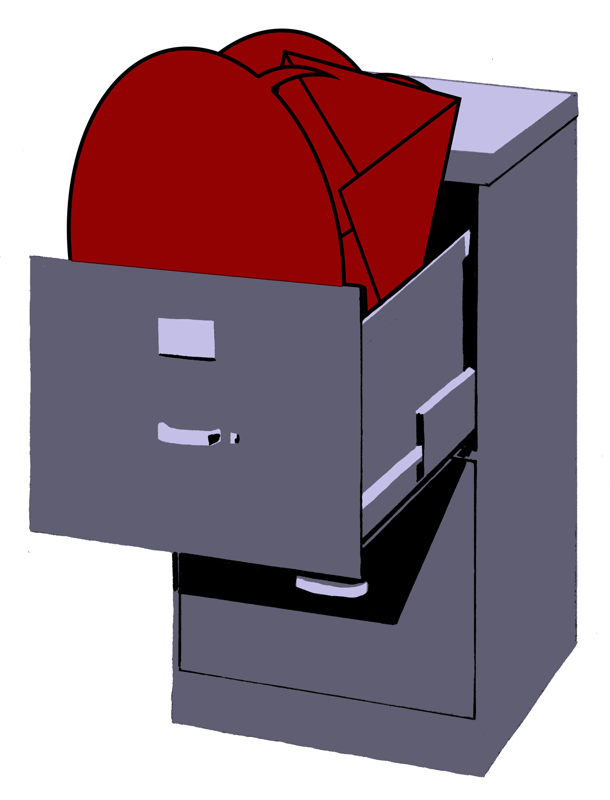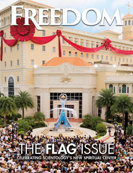It has greatly expanded the powers of the federal government to collect and store information about American citizens, even when they are suspected of no crime. It allows U.S. intelligence agencies to conduct clandestine, warrantless searches. It’s been the bête noire of civil libertarians for 14 years—and Congress has less than a month to do something about it.
On June 1, three key provisions of the Patriot Act—hastily passed in the wake of the 9/11 terror attacks—are set to expire, and legislators must decide whether to renew, reform or terminate them: Section 215, under which the U.S. government has collected the phone records of millions of U.S. citizens indiscriminately and in bulk; the so-called ‘lone wolf’ authority, which extends Foreign Intelligence Surveillance Act (FISA) powers to allow warrantless government spying not just on an “agent of a foreign power” but on any “non-U.S. person” suspected of “international terrorism or activities in preparation therefore”; and Section 206 allowing for “John Doe”roving surveillance authority—meaning that the FBI can wiretap every phone line, mobile communications device or Internet connection that a suspect might be using, for up to a year, without ever having to identify a suspect by name.
The backronym of the USA PATRIOT Act is a mouthful: Uniting and Strengthening America by Providing Appropriate Tools Required to Intercept and Obstruct Terrorism Act. (Clearly designed, according to Georgetown University law professor David Cole, to paint anyone who criticizes the law as not only unpatriotic but a traitor.)
Section 215, nicknamed the “library records” and “business records” provision, is the legislation’s most controversial instrument, allowing, among other things, the National Security Agency (NSA), America’s most powerful and secretive intelligence service, to collect information about every phone call originating or terminating in the U.S.—who called whom, when and for how long.
Leading up to its ’sunset’ in June, lawmakers are gearing up to battle over the fate of Section 215 and the NSA domestic bulk collection program. On April 21, Republican members of the U.S. Senate announced a bill that would renew Section 215 until December 31, 2020. Introduced by Senate Majority Leader Mitch McConnell, the bill is expected to go straight to the Senate floor, bypassing any debate at the intelligence committee level.

The American Civil Liberties Union (ACLU) swiftly and strongly opposed the bill. “The Patriot Act has been at the root of many of the most serious abuses of government spying powers,” said ACLU Executive Director Anthony D. Romero in a statement. “We need to have a serious debate about the effectiveness of the Patriot Act and its implications for civil liberties. Until that happens, Congress should let Section 215 of the Patriot Act expire with the whimper it deserves.”
Three days after the announcement of the Senate bill, lawmakers in the House of Representatives indicated they will introduce a bipartisan measure aimed at scrapping Section 215. Expected to be a new version of the 2014 USA Freedom Act, whose name it will share, the proposed House measure will seek to end the government’s bulk collection of communications data and introduce more robust privacy and transparency safeguards. The original USA Freedom Act passed the House but failed by two votes in the Senate in November 2014. It was authored by Rep. Jim Sensenbrenner, a Republican from Wisconsin who has criticized the use of Section 215 as being “at odds with congressional intent.” Sensenbrenner also co-authored the Patriot Act.
Section 215 of the Patriot Act allows the National Security Agency to collect information about every phone call originating or terminating in the U.S.—who called whom, when and for how long.
According to a November 2014 Pew Research Center survey of public perceptions of privacy and security, 80 percent of adults agreed or strongly agreed that Americans should be concerned about intelligence agencies snooping on phone calls and Internet communications.
Matthew Burrows, director of the Washington-based Atlantic Council’s Strategic Foresight Initiative and a retired CIA officer who served as the National Intelligence Council’s director of analysis for the past decade, explains why many politicians have a different view: “If there’s a huge threat they need to protect against, and if it’s a question of maybe a little more snooping, the thinking is that maybe that’s the price to be paid.”
Yet at least two review and oversight boards appointed by President Barack Obama have concluded, after analyzing classified material, that there is no evidence the NSA’s mass surveillance program has helped prevent a single act of terrorism or even played a crucial role in any terrorist investigation.
The first indication that Americans were under mass surveillance came on the morning of December 16, 2005, when the country awoke to the shocking news that President George W. Bush, who signed the Patriot Act into law, had authorized a sprawling domestic surveillance program almost immediately after the September 11 attacks. In a story titled “Bush Lets U.S. Spy on Callers without Courts,” The New York Times informed the nation that the warrantless surveillance program was based on “classified legal opinions that assert that the president has broad powers to order such searches.” In a subsequent story the Times revealed “the NSA has gained the cooperation of American telecommunications companies to obtain backdoor access to streams of domestic and international communications.”
With the help of sophisticated software, the NSA was systematically mining metadata containing phone and email records. Congress reacted with rare bipartisan disapproval, even as President Bush denied his administration had violated any laws or infringed on citizens’ civil liberties.
The staggering size and scope of the NSA’s bulk-surveillance came to light later, in June 2013, when Edward Snowden, a former Dell employee who worked as a contract systems administrator for the intelligence agency, leaked to Britain’s The Guardian newspaper classified documents about the NSA’s vast surveillance programs, which include the content of electronic communications of non-U.S. persons located overseas and the warrantless, mass collection of Americans’ phone records.
As Snowden tells it, the NSA’s mass data collection program is code-named STELLAR WIND, and is a top-secret arm of another clandestine NSA data-collection program code-named PRISM, which the agency launched in 2007.
According to details that Snowden released about the PRISM program (which the government has since confirmed), together with Government Communications Headquarters (GCHQ), Britain’s elite counterterrorism outfit, the NSA had secretly attached intercepts to the fiber-optic cables that ring the world’s ocean floors, enabling the U.S. and Britain to tap in to global communications traffic.
What’s more, according to Snowden, acting on the behest of secret court orders, practically all of Silicon Valley, including AT&T, Verizon, Google, Apple, Facebook, Yahoo, Microsoft, Skype and YouTube, was supplying data to the NSA, which was then shared with GCHQ. (Despite extensive media coverage of the scandal, the telecom and Internet companies that Snowden named have denied any involvement with the PRISM program.)
NSA’s director at the time, Gen. Keith Alexander, responded to Snowden’s allegation by saying at a 2013 congressional hearing that the agency’s mass data collection had been conducted less than 300 times in the previous year. Only a few NSA employees who had “reasonable, articulable [sic] suspicion” that the records were connected to a specified terrorist group accessed this data, Alexander said.

Still, watchdogs and privacy advocates contend that bulk data collection, which continues still, violates the Fourth Amendment rights of Americans “to be secure in their persons, houses, papers, and effects, against unreasonable searches and seizures.”And surveillance-reform activists have always been concerned that Patriot Act provisions such as Section 215 can be used to spy on people who don’t have any nexus to terrorism or any kind of crime.
“Once we had the Snowden revelations, it turned out that a lot of those concerns that we and others had raised over the years were very legitimate,” says Neema Guliani, legislative counsel for the ACLU, which has opposed the Patriot Act in its entirety since the day it became law. “We now know that these programs were being used for a kind of mass surveillance—the government was collecting millions upon millions of records that were not based on any sort of suspicion and didn’t comply with the law.”
President Obama, in a statement to the American people shortly after the Snowden leaks, asserted that there’s a fine balance between national security and civil liberties.“I think it’s important to recognize that you can’t have a hundred percent security and also then have a hundred percent privacy and zero inconvenience,” he said, adding: “You know, we’re going to have to make some choices as a society.”
“We fought a revolution over issues like generalized warrants, where soldiers would go from house to house, searching anything they liked.” —Sen. Rand Paul (R), who recently announced his 2016 presidential bid. The NSA’s surveillance, he added, is an “extraordinary invasion of privacy.”
Some staunch supporters of the Patriot Act don’t see things that way. “To my dismay, it has seeped into the nation’s drinking water that the Patriot Act requires a trade-off between civil liberties and privacy on the one hand, and the protection of national security on the other,” former Deputy Attorney General James Comey writes in the preface to the American Bar Association book, Patriot Debates, which was published in 2005, the first time that Congress renewed Section 215 with little or no debate. “I reject that.” The Patriot Act, Comey emphasizes, “allows us to serve and to protect, to borrow a phrase, and it is fully consistent with our reverence for civil liberties and individual freedoms.”
ACLU’s Guliani concurs with Comey’s argument—but for wholly different reasons. “The notion that national security and civil liberties are at odds is a false dichotomy,” she says. “The mass surveillance program operated under Section 215, which has resulted in the loss of privacy for every American, has not helped stop terrorism. And some security experts have even said that it hurts national security by making it more difficult for law enforcement officials to focus resources on the individuals who actually pose a threat.”
The NSA’s bulk collection program is governed by the Foreign Intelligence Surveillance Act, passed by Congress in 1978 in the wake of the Watergate scandal in an attempt to restrict the warrantless surveillance of citizens. Although FISA authorizes the so-called Foreign Intelligence Surveillance Court (FISC) to issue warrants, the court is a secret intelligence entity known to have a penchant for rubber-stamping government requests. (Only the Justice Department argues before the court; no lawyers with adversarial viewpoints are permitted.)

FISC is required to give Congress, through the U.S. attorney general, an annual report, with the number of warrants sought and approved. From 1979, when the secret court was set up, to 2013, the court approved 35,434 of the government’s applications for warrants, and rejected only 12, according to the Electronic Privacy Information Center. Of the 1,981 applications from 2000 to 2012 for wiretapping specific phones, none were rejected.
Created in 1952 at the height of the Cold War, the NSA has historically monitored enemy states, terrorism suspects and friendly nations alike. And perhaps because the September 11 plot originated overseas but was executed within U.S. borders, the 2001 attacks on New York and Washington provided the impetus for combining the strategies of foreign intelligence agencies, including the CIA, and domestic intelligence, particularly the FBI.
“The firewall that had long separated the two was brought down, as controversial surveillance techniques long used abroad but anathema at home became ubiquitous,” writes former Washington Post and Time magazine investigative reporter Ted Gup in his 2007 book, Nation of Secrets: The Threat to Democracy and the American Way of Life. “Many of those techniques would offend American sensibilities and notions of civil liberties.”
The NSA’s harvesting of raw telephone data (obtained through the FBI) has been strongly criticized by the Privacy and Civil Liberties Oversight Board, appointed by the White House in the aftermath of the Snowden scandal. In a report last year, the independent and bipartisan board found four grounds on which the NSA’s data collection failed to comply with Section 215.
U.S. District Court Judge Richard Leon, a Bush appointee, said that he could not “imagine a more indiscriminate and arbitrary invasion than this systematic and high-tech collection and retention of personal data on virtually every citizen for purposes of querying and analyzing it without prior judicial approval.”
The first was that the phone records of Americans have “no connection to any specific FBI investigation at the time of their collection.” Second, “because the records are collected in bulk—potentially encompassing all telephone calling records across the nation—they cannot be regarded as ‘relevant’ to any FBI investigation as required by the statute.”
The board’s third objection centered on the fact that the NSA program forces telephone companies to furnish new calling records on a daily basis as they are generated, instead of turning over records already in their possession—“an approach lacking foundation in the statute.” Finally, and perhaps most pertinently, the board pointed out that Section 215 “permits only the FBI to obtain items for use in its investigations; it does not authorize the NSA to collect anything.”
In addition, the board concluded, the NSA’s program violates the Electronic Communications Privacy Act, which prohibits telephone companies from sharing customer records with the government “except in response to specific enumerated circumstances, which do not include Section 215 orders.”

The NSA regularly uses Section 215 to collect records from hotels, car-rental agencies, state DMVs, credit card companies, even landlords, according to Justice Department reports. Further, the NSA distributes phone metadata to other intelligence agencies through a shared database known as “the corporate store.”
The practice has angered Congress, which is tasked with the constitutional duty of oversight over the nation’s intelligence agencies. “We fought a revolution over issues like generalized warrants, where soldiers would go from house to house, searching anything they liked,” said Sen. Rand Paul (R), who recently announced his 2016 presidential bid. The NSA’s surveillance, he added, is an “extraordinary invasion of privacy.”
U.S. District Court Judge Richard Leon, a Bush appointee, remarked in 2013 that he could not “imagine a more indiscriminate and arbitrary invasion than this systematic and high-tech collection and retention of personal data on virtually every citizen for purposes of querying and analyzing it without prior judicial approval.”
Because legislators on Capitol Hill are scheduled to break for recess on May 23, surveillance-reform lawmakers in the Republican-controlled Congress have less than a month to coalesce around a strategy to tackle the NSA’s bulk collection of data.
“This is the first time since the Snowden revelations that members of Congress are going to be looking at the issue of mass surveillance in a public way, with their eyes wide open about what is actually happening,” says ACLU’s Guliani. “So there is a greater pressure and a greater onus to reassess what they’ve done in the past.”
Watchdog groups are also waiting to know the fate of the NSA’s data-trawling PRISM program. A number of related initiatives have been brought before Congress, including a June 2013 bipartisan measure by two Michigan congressmen, Democrat John Conyers and Republican Justin Amash, to amend the roughly $600-billion Department of Defense Appropriations Act of 2014, which would have defunded the NSA’s mass surveillance program affecting Americans as well as mandated the publication of secret FISA Court opinions.
The widely—and dramatically—televised measure failed narrowly by a 205-217 vote. According to Wired magazine, the 217 members who voted against the amendment “received twice as much campaign financing from the defense and intelligence industry” compared to the 205 who voted for the measure.
According to documents leaked by Snowden and published by The Washington Post, the CIA and NSA took the lion’s share of the $52.6-billion top-secret “black budget” for U.S. intelligence agencies in 2013. As much as $17 billion of the black budget is spent on counterterrorism each year on average.
Keeping track of the torrent of information over the Internet (some 210 billion emails and 50 million tweets are sent out on an average day) is a big part of the NSA’s job. Although the NSA copies much of the Internet traffic that streams through AT&T’s main hub in San Francisco, the agency is clearly running out of space to process all that data. Last year, the NSA opened two new stadium-sized complexes at a cost of $1.5 billion in the mountainous Utah town of Bluffdale.

There seems little doubt that at a time of rapid changes not just in technology but also law and politics, “there is an enormous temptation for government agencies to expand surveillance and information gathering,” in the words of Steven Aftergood, the highly respected director of the Project on Government Secrecy at the Federation of American Scientists. “Without an effective system of checks and balances, sooner or later such surveillance will get out of control.”
Scott Horton, who teaches at Columbia Law School and has won the National Magazine Award for his reporting on law and national security issues, has an insight into what might happen to any efforts by Congress to rein in the NSA: “Most likely the silent influence of defense contractors will control the day and avoid any meaningful control or change in legislation.”






























